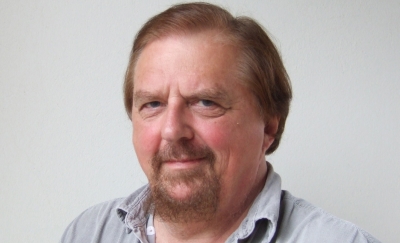
Future Tense is the title of one of Gwynne Dyer’s many best-selling books. His expertise has been war, with detailed analyses of the politics, psychology and circumstances that bring humanity to this most crude and unfortunate behaviour. And this book’s title has a ingenious double entendre, suggesting both the future and a time of tension. It aptly represents Dyer’s realization that climate change is creating the conditions that could lead to military conflict.
Dyer is probably too much of a realist to be an optimist. His other books on this subject include Climate Wars and Climbing Out of the Wreckage, dystopian views anticipating the stressful conditions created by global warming. Such was the subject of his presentation in Comox, BC, on the evening of May 23, 2013. He divided his comments into four parts.
First was “How Big and How Fast”. In summary, his answer is “very big” and “very fast”. The villain is our emissions of carbon dioxide. Burning massive quantities of fossil fuels has forced up atmospheric concentrations from pre-industrial levels of 280 parts per million, to 320 ppm at the end of World War II, to 400 ppm today. In Dyer’s opinion, we will not hold global average temperatures below the critical tipping point of 2°C. He expects 6°C within a century. Volcanic activity 50 million years ago took 10,000 years to increase global temperatures by this much — almost instantaneous in geological terms. The event reduced large portions of the planet to desert, and 2 million years were required before it returned to more comfortable conditions. Needless to say, life in the biosphere suffered huge extinctions — precisely what is happening now, except much faster. Dyer agrees with James Lovelock, the father of modern environmental science, that the global climate changes will eventually reduce our human population from its current 7 billion to about 500 million.
Dyer bases this prediction on climate feedback loops that will accelerate the warming process. He describes the melting Arctic as the critical factor. Sea ice has shrunk from a traditional cover of 10 million square kilometres to 3.5 in 2012, and he expects the summer ice cover to be zero in a decade. The warming of land in northern latitudes will melt permafrost, releasing massive quantities of stored carbon dioxide and methane — Dyer describes melt ponds burning until the end of summer after Inuit boys have set aflame the escaping methane. More carbon dioxide will be released as the world’s oceans warm. The effect on the planet’s climate will be massive.
The second part of Dyer’s presentation was “Climate and the Military”, the linkage that was the genesis of his interest in climate issues. The military in the US, Britain and elsewhere, he learned, has long been processing scenarios of conflict initiated by such stressors as drought, floods and famine, trying to calculate how to address the threats generated by masses of “climate refugees” fleeing distress. In the ensuing political chaos, the military challenge will be to secure borders, maintain order and protect national interests. Climate refugees are already a source of conflict.
Southern Africa and Australia are presently moving toward deserts that will not support their present populations. The same is happening in northern Mexico. Will Americans close their border to millions of starving Mexicans when 20 percent of US citizens have family connections with those refugees? What measures will Iraq take to continue irrigating its essential crops when Turkey uses all the shrinking flow of the Tigris-Euphrates River? India governs the flow of a drying Indus River which Pakistan needs to feed 160 million of its people. And China now controls the headwaters of several important rivers that are critical to Southeast Asian food production. These are but a sample of stress points that could erupt into war within 15 to 20 years, according to Dyer.
The military scenarios are sobering. Climate modelling predicts that subtropical regions will lose about half their rainfall, throwing 20 to 30 states into political collapse. Such failed states create both national and international stresses — witness Somalia, Dyer suggests, as a breeding ground of pirates and terrorists. Now multiply this by a factor of 20 or 30.
A major difficulty, Dyer explains, will be the incompatibility of rising temperature and crops. Most of the food grown in the tropical and subtropical latitudes comes from plants native to temperate climates. Rice, soy, wheat and maize are already growing at the limit of their heat tolerance. A temperature increase of 1°C reduces production by 10 percent; 2°C reduces production by 25 percent. Above 32°C these crops come close to total failure. On a warming planet, what will a world do with 300 million Indians unable to feed themselves? China is haunted by the same threat. The military forces of major countries are trying to imagine this future and prepare for the consequences.
The third part of Dyer’s presentation was “Why Don’t We Act?” Well, he says, we know what to do. Developed countries, the cause of 80 percent of the excessive atmospheric carbon dioxide, would have to reduce their emissions by 40 percent in 10 years. And they would have to give advanced technology and billions of dollars to developing countries for them to stop any increase in their emissions. This, in Dyer’s opinion, is not going to happen. No politician in any rich country will win an election on a platform of huge giveaways and massive costs. Most of the scientists and all the generals he interviewed expect carbon dioxide levels to rise to 500 or 550 ppm with temperatures increases of 6°C.
The fourth part of Dyer’s presentation was “The Future”, with a secure place for the military. As stresses and conflicts increase, the likelihood of negotiated agreements will decrease — even now, at an optimal time to reach solutions for climate change, we are failing. The fallback strategy, Dyer suggests, “after we lose a few hundred million people”, will be geo-engineering. “Lest I leave you with any sense of optimism,” he said wryly, this strategy may stave off an escalating catastrophe — if it works. In such critical times, agreeing on what to do and when to do it will be an added source of tension.
Dyer gives his last thought to an old friend he calls “Jim”. He recalls James Lovelock saying that the sorry price of human folly will be the horrible struggle of perpetually maintaining a livable climate that we once got for free.


Sunday, 16 June 2013 09:24 posted by oGAZFNDRiR
buy vicodin vicodin es time release – where to buy vicodin online forum
Sunday, 09 June 2013 15:28 posted by the salamander
.. thanks for the article & link Ray .. as always .. ‘stimulating’ if not frightening or disheartening..
but always truthful & informative..
I predicted years ago that we in Canada would eventually see unstoppable ‘immigration’ from Asia. Not immigration where coast guard ships stop and examine/detain.. but immigration levels that overwhelm any ludicrous government fantasy of ‘control’ or law.
In the meantime.. we have federal and provincial politikal wankers that are busy with their little bo peep ekonomik prosperity platforms and so what if they trigger the extermination of polar bears, wild salmon, orca, boreal caribou .. and if they can extinguish First Nations treaties and the Charter of Rights and Freedoms and dabble in electoral fraud along their way..
Well .. c’est la vie .. & sorry ..
and when we find that our inland waters & aquifers are as dirty and toxic as our coastal and littoral waters ..
what then Mr Harper ? Ms Clark
You’re sorry ? Its not your fault ?
We should contact China’s complaint department ?
What pond scum we allow to ‘lead’ in this country now..
Ethical weaklings, carpet baggers,
sellouts, zealots, women and men of zero vision
No glowing hearts
Sunday, 09 June 2013 15:10 posted by opit
I can’t figure out whether I’m an optimist or a pessimist compared to you. At least with Desmedoma Despair I could figure out we shared awareness of multiple dramatically awful problems threatens our existence….while sniping that of those problems at least climate change was merely an allegedly human caused problem – a proposition that would have put adherents in the funny farm not too long ago. Or not. Yet I have to credit you with savvy that the proposed path will not be willingly taken – while I am seeing stories of actions en route to force compliance.
Rather than promote one idea against the momentum of belief, let me share some views I thought interesting. http://my.opera.com/oldephartte/blog/2013/03/08/climate-of-obfuscation
Sunday, 09 June 2013 10:10 posted by John King
Al Bore:
I think you are not able to see the crisis because you are within the crisis. It’s happening right now. The number of catastrophic natural disasters is increasing (turn on your television and take in the floods occurring right now in Central Europe).
The number of wars is multiplying due to a lack of food, and other climate change-related problems. Regions are either experiencing extreme drought, or extreme flooding.
The ice at both our polar caps is melting. Just look to the story of our polar bears who have resorted to eating their young. This is well-documented.
Look to the American Eastern Starboard. It’s in ruins due to Hurricanes. They’re getter bigger and more damaging every year. One year, it’s New Orleans. One city. A couple years later, it’s an entire coastline. Many cities.
Perhaps, Al Bore, you need to step out of your little bubble. And next time give people your real name. Why hide behind a fake name?
Saturday, 08 June 2013 12:37 posted by Al Bore
So what has to happen now for the scientists to say that their crisis is as real as they like to say a comet hit crisis is real, not just possible, potentially and likely and….. Why can’t they call their crisis inevitable or eventual or imminent or just WILL be a real crisis. Only a comet hit could be worse. You can’t have a little tiny catastrophic climate crisis outside of Harry Potter movies.
They only have consensus that “climate change” is “real and happening” but do not believe or agree that climate change will be a real crisis as they have never said it.
28 years of maybe a crisis proves it won’t be a crisis. Deny that!
Friday, 07 June 2013 19:07 posted by Jymn
If I was a screenwriter (say a Cronenberg), I’d pen a Canadian film set 50 to 100 years in the future as Canadians battle Americans surging across our borders for the cool, productive land. It’s a scenario that’s all too real. How would we do? Or more exactly, how long would we last before hungry Republicans trash our country, too.